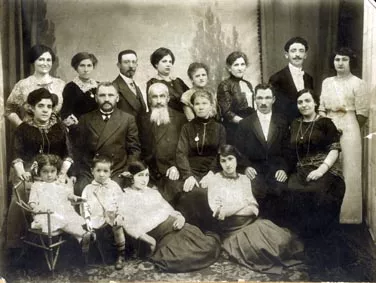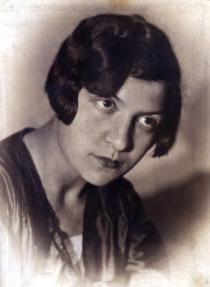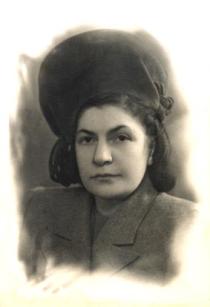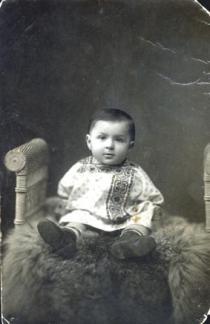This photograph taken in Riga in 1910 shows our family before my birth.
My mother's parents' names were Sara Isaakovna and Shmul Yuda. I do not remember the way people called them in Russian. My maternal grandmother died in 1933 at the age of eighty three or eighty four. So what year was she born then? We can count. I guess it happened in 1850. My mother's father died earlier and was buried in Ostashkov [a town in Russia founded in 1770; it is situated 190 km far from Tver.] We do not know where his grave is. And my grandmother Sara is buried here in Petersburg on the Jewish Preobrazhenskoe cemetery [the Jewish part of the Preobrazhenskoe cemetery in St. Petersburg was opened in 1875]. I visit her grave often.
My father's parents lived in Belarus in Boychekovo shtetl [a village near Vitebsk]. I do not remember if they died before the war or during it.
My maternal grandparents knew Russian. And of course they spoke Yiddish. They lived in Riga, there my Mom got married, and there I was born. By the beginning of the war all our relatives appeared (some of them came earlier) in Russia. We settled near Ostashkov, at the railway station Peno. [Peno is a settlement near the Volga River]. I went to school there. I remember a saw-mill situated nearby. We also often visited Polotsk [an ancient city in Vitebsk region of Belarus].
I am sure that I have wedding photographs of both my maternal and paternal grandparents. I keep them somewhere. My father's father was a very handsome man. And grandmother, his wife was an ugly monkey. I remember my paternal grandfather well. And Mom was rather nice…
All of them worked (I mean my grandfathers, because most women did not work at that time). My mother's father was a timber examiner. In Riga most Jews were engaged in it. And I do not know where my father's father worked. We visited them in Boychekovo only once. I guess my paternal grandfather occupied some position at the synagogue, I do not remember anything more...
My grandmothers and grandfathers were religious people, of course. I guess at that time most people were religious. We lived at my paternal grandfather in Ostashkov for a long time. There was a synagogue. In day-to-day life they used to wear ordinary clothes, but at the synagogue they certainly put on tallit, dressed in accordance with the rules. I do not remember if grandmother attended the synagogue. And at Peno railway station there was no synagogue, my paternal grandparents were the only Jews there. But they used to go to Ostashkov to visit synagogue, because my grandfather and father were religious.













